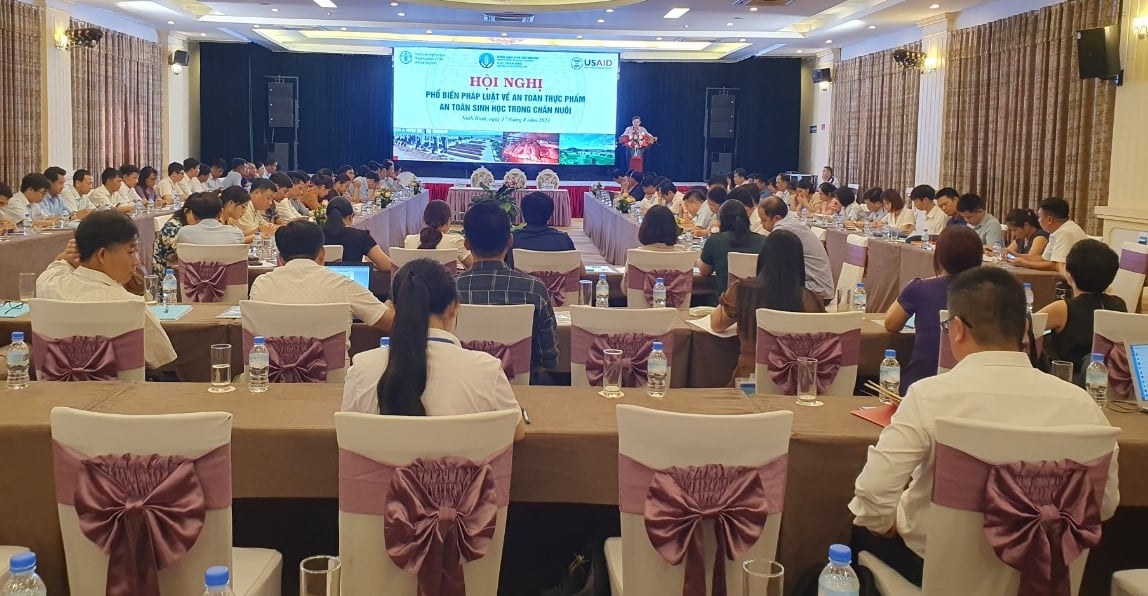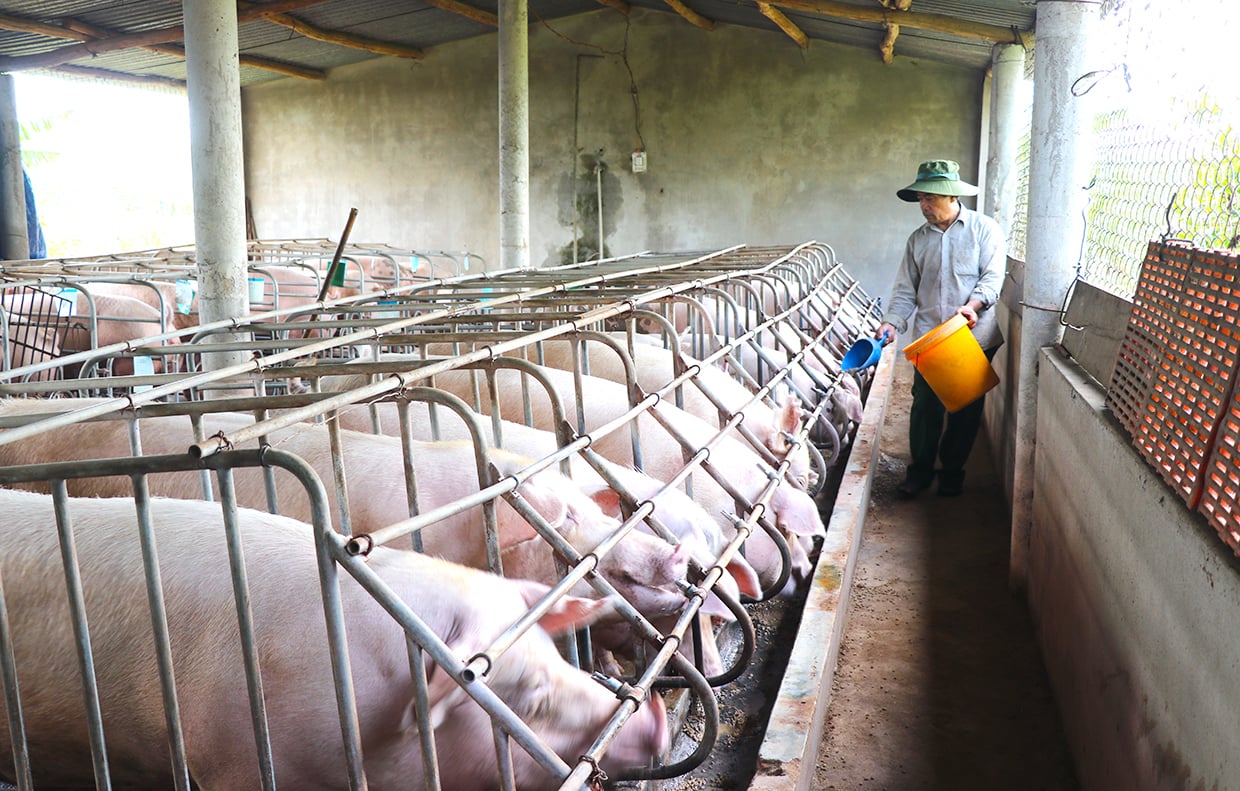June 21, 2025 | 03:36 GMT +7
June 21, 2025 | 03:36 GMT +7
Hotline: 0913.378.918
June 21, 2025 | 03:36 GMT +7
Hotline: 0913.378.918

The Conference to disseminate the law on food safety and biosecurity in livestock took place on the morning of August 17 in Ninh Binh, organized by the Department of Livestock Production. Photo: HT.
Speaking at the Conference, the Director of the Department of Livestock Production Duong Tat Thang, said that over the years, the livestock industry has always played an essential role in the economic development and ensuring the country's food security.
With 24.8 million pigs, 8.7 million cattle, and 557 million poultry, the livestock industry has created many meat, egg, and dairy products to meet domestic consumption and export-oriented needs.
“To achieve the achievements mentioned above, in addition to applying scientific and technological advances in animal husbandry, the development and completion of a system of legal documents and supporting policies for effective management of production activities is also required. Livestock production has always been identified by the Department of Livestock Production, Ministry of Agriculture and Rural Development as one of the most important and prioritized political tasks", said Director General Duong Tat Thang.
At the Conference, the Department of Livestock Production presented several regulations on livestock production activities and breeds.
According to the Department of Livestock Production, at present, livestock breeding and breeding activities have a relatively complete and transparent system of relevant legal documents such as Law on Livestock; Decree 13/2020/ND-CP; Decree 46/2022/ND-CP; Circular 20/2019/TT-BNNPTNT; Circular 22/2019/BNNPTNT; Circular 23/2019/TT-BNNPTNT.
For the management of banned substances in livestock, there are also relevant documents such as Law on Livestock; Circular 21/2019/TT-BNNPTNT; Circular 57/2012/TT- BNNPTNT; and Circular 01/2016/TT-BNNPTNT.
Accordingly, the Conference fully disseminated new legal provisions of the livestock industry, especially QCVN 01-195: 2022/BNNPTNT, and published and implemented a monitoring program for banned substances belonging to the Beta-Agonist group (Salbutamol, Clenbuterol) and Ractopamine in livestock.
Discuss and propose to remove obstacles and inadequacies in livestock law enforcement and receive feedback from management agencies, businesses, and breeders to serve as a basis for offering the development and improvement of the livestock production system of legal documents in the field of animal husbandry in the coming time.
The livestock industry in Vietnam tends to shift from household scale to concentrated and intensive farming on a large scale. Along with that trend, livestock pollution in rural areas is becoming more and more serious.
According to some agricultural experts, the leading cause of pollution is small-scale livestock production and uncontrolled environmental discharge. However, through the survey in Vietnam, farm-scale and intensive farming, despite environmental treatment measures, still causes severe environmental pollution due to work-related reasons on ecological management and inappropriate technology application.

Farm-scale livestock production must have enough water sources to ensure livestock production and waste treatment quality. Photo: HT.
Accordingly, the Department of Livestock Production also disseminated new regulations related to the livestock environment, such as Classification of the size of livestock establishments; regulations on locations and locations of livestock production establishments; environmental protection conditions for livestock production establishments; regulations on livestock waste management; regulations on ecological monitoring and environmental reporting; compensation for environmental damage.
As for the regulations on the location and location of livestock and livestock establishments, the farm must meet the following conditions: The location of the farm must be suitable to the socio-economic development strategy of the livestock locality, and the region meet the requirements of the specified livestock density.
There are enough water sources to ensure quality for animal husbandry activities and livestock waste treatment. Take measures to protect the environment by the law on environmental protection. There are stables and breeding equipment suitable for each type of animal.
Having records to record the process of livestock production, use of animal feed, veterinary drugs, vaccines, and other information to ensure the safety of animals and traceability, record keeping for a minimum period of 1 year after the end of the breeding cycle.
There is a safe distance from the farming area to the subjects affected by livestock production activities and from the source of pollution to the farming area. Organizations and individuals raising large-scale farms must be granted a Certificate of eligibility for livestock production.
As for animal husbandry, households must meet the following requirements: Cages must be separate from people's residences; periodically clean, disinfect and disinfect livestock barns and tools; take appropriate measures to clean and prevent epidemics; collect and treat manure, livestock wastewater, livestock carcasses, and other livestock wastes following the law on veterinary medicine and environmental protection.
The Conference to propagate and disseminate the provisions of the law on food safety and biosecurity in animal husbandry has contributed to raising awareness, roles, and responsibilities of each organization and individual in the field of animal husbandry of ensuring the safety of food circulating in the market.
Translated by Tu Quyen

(VAN) The waste of resources from agricultural by-products and the situation of counterfeit and poor quality goods in production causing losses of thousands of billions were pointed out by the National Assembly deputy.

(VAN) After 5 years of implementation, the CAI initiative has helped coffee growers change their farming practices, moving toward responsible agriculture that meets global export standards.

(VAN) The primary prerequisite for the comprehensive and robust integration of Vietnam's livestock sector into the global value chain is the establishment of a disease control system.

(VAN) The results of national programs are essential for establishing a contemporary livestock sector that is well-equipped to meet the demands of both domestic and international markets, with robust biosafety standards.

(VAN) The UNESCO Global Geopark revalidation of Non nuoc Cao Bang and the transition to a two-tier administrative model are presently undergoing a pivotal moment in Cao Bang, the northernmost province of Vietnam.
/2025/06/13/5330-2-004539_953.jpg)
(VAN) Changing policy mindset and removing investment barriers are urgent requirements to open up new development space for enterprises in the agricultural sector.

(VAN) The areas include the restoration of five million hectares of marine ecosystems.